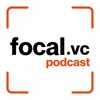
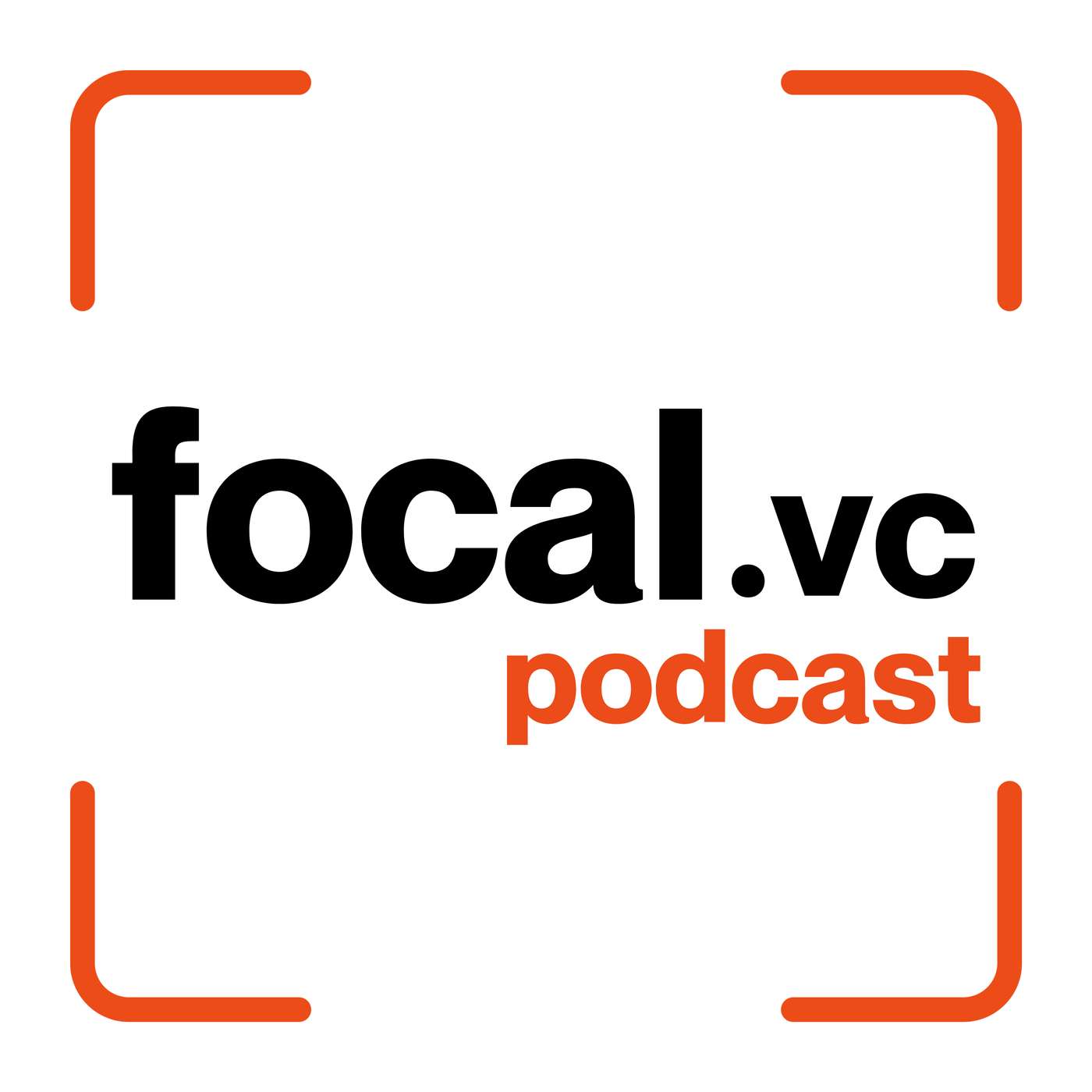
focal podcast
Pascal Unger
Pivotal early lessons of today's best startups.
Welcome to the focal podcast where we go deep with some of today's best founders and operators on ONE crucial lessons from their early days.
This podcast is not the usual "highlight reel" startup podcast that goes one inch deep across 20+ topics. Rather, we ask the questions you’d ask if you were sitting across from them. No fluff, just the real, actionable insights you’d get if these founders were mentoring you 1on1.
We cover topics including:
- What worked and why.
- Costly mistakes and how they fixed them.
- Frameworks that truly made a difference.
- Tactics to move faster.
- What they wish they’d known sooner.
- And much more!
"Only a fool learns from their own mistakes. The wise learn from the mistakes of others."
Welcome to the focal podcast where we go deep with some of today's best founders and operators on ONE crucial lessons from their early days.
This podcast is not the usual "highlight reel" startup podcast that goes one inch deep across 20+ topics. Rather, we ask the questions you’d ask if you were sitting across from them. No fluff, just the real, actionable insights you’d get if these founders were mentoring you 1on1.
We cover topics including:
- What worked and why.
- Costly mistakes and how they fixed them.
- Frameworks that truly made a difference.
- Tactics to move faster.
- What they wish they’d known sooner.
- And much more!
"Only a fool learns from their own mistakes. The wise learn from the mistakes of others."
Episodes
Mentioned books
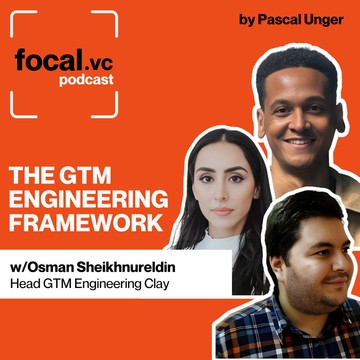
Dec 17, 2025 • 1h 15min
The Clay Playbook for Hyper-Targeted Outbound | How to Turn Multiple Signals Into One Story | Why Your List Matters More Than Your Message | The "Magic Wand" Framework for Finding Your Best Customers with Osman Sheikhnureldin, Head GTM Engineering at Clay
Most founders think GTM engineering is just cold outbound done better. Clay's Head of GTM Engineering Osman Sheikhnureldin reveals why that mindset will cost you months of wasted effort.In this episode, Osman walks us through exactly how to identify your ideal customers at the perfect moment, then demonstrates his framework live with two early-stage founders - showing you can't just wing GTM engineering, but when done right, the results compound.Osman Sheikhnureldin is the Head of GTM Engineering at Clay, the company that invented GTM Engineering. He's helped hundreds of startups transform how they use data and technology to remove growth constraints. Joining him are Nilo Rahmani, Co-founder and CEO of Thoras AI (AI-driven cloud reliability and cost optimization), and Panos Papageorgiou, Co-founder of Keragon (HIPAA-compliant automation platform for healthcare).In Today's Episode We Discuss:01:51 - GTM engineering defined: Solving growth constraints with technology, not headcount02:57 - Why your target list matters more than your message will ever matter04:45 - Ditch static ICPs: The jobs-to-be-done framework that actually works06:53 - The "magic wand" question every founder must answer before building workflows08:49 - The account scoring workflow no human should ever do manually again13:46 - How Clay built an ML model to predict contract value from enrichment data19:18 - Vanta's genius GTM hack using AI screenshots to analyze brand consistency21:30 - European food startup's signal stack: First US hire + ad spend + new landing pages23:06 - Early-stage messaging must be hyper-specific—big company tactics won't work for you26:54 - Founders who lived the pain have an unfair advantage in outbound messaging28:59 - Counterintuitive truth: AI SDRs have failed—human taste matters more than ever31:48 - Why hybrid LLM + human skeleton emails crush pure AI-generated copy34:42 - Voice AI skepticism: Great for extraction, not ready for cold calls37:18 - Three brutal truths: GTM engineering takes months, hard work, and real creativity38:20 - "Earn the right to message someone"—the philosophy behind effective outbound39:24 - Live teardown: Keragon's healthcare GTM using EHR migration as the trigger signal47:08 - Finding EHR signals through PR announcements, patient portals, and RSS feeds55:38 - Live teardown: Thoras AI's challenge—spotting cost-cutting triggers that signal growth01:00:58 - Why "cutting costs" often means a company is scaling, not struggling01:07:32 - Novel signal: Second product launch as the perfect moment to reach infrastructure teams01:13:06 - The biggest misconception: GTM engineering goes far beyond cold outbound
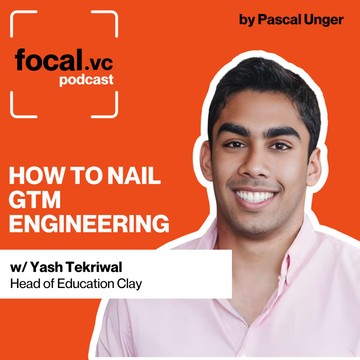
Dec 11, 2025 • 1h 2min
Why GTM Engineering is the Future | When to Hire Your First GTM Engineer | How to Treat GTM Like a Product | How Clay Scaled from PLG to Enterprise | Automate the Manual, Never the Important with Yash Tekriwal, Head of Education at Clay
Clay pioneered GTM engineering and went from $1M to $100M in ARR in 2 years. I talked to the person who invented the role of GTM Engineer at Clay.Yash Tekriwal, Clay's first GTM engineer - back when the $3B company was still figuring out what that even meant.What started as one person drowning in too many jobs (RevOps + Sales + BDR + data analyst) has since become a new category that's now reshaping how startups think about go-to-market.You’ll learn:Why RevOps is "maintenance" but GTM engineering is a growth leverThe skills that define a great GTM engineer today (hint: it involves vibe coding)What "treating go-to-market like a product" actually looks like in practiceTwo org models for GTM engineering teams - and which to start with"Automate the manual, but don't automate the important"In Today's Episode We Discuss:01:23 - The origin story of GTM engineering at Clay and why the term is polarizing05:02 - GTM engineer vs RevOps: maintenance function versus growth lever07:31 - Treating go-to-market like a product team, not an individual sport10:42 - Three experiments every GTM team should run on inbound and outbound15:24 - The essential GTM tech stack: CRM, enrichment, sequencing, and what actually matters19:08 - Tools founders should consider when getting started—and the automation trap to avoid22:12 - Zero to $1M: be thrifty on tools and process information manually25:38 - What to look for in your first GTM engineering hire (hint: it's not technical skills)28:43 - Signals that you need to hire a GTM engineer for outbound vs inbound motions31:45 - Scaling past $10M: specialize fast and the hyperscaler dilemma36:01 - Two org models for GTM engineering: centralized hit team vs embedded engineers40:22 - The ideal GTM engineer profile: tinkerers, not traditional engineers43:33 - Why engineers are not the ideal candidates for GTM engineering roles45:19 - Can salespeople become great GTM engineers? The sales hacker archetype47:26 - Resources to learn GTM engineering: Clay University, substacks, YouTube channels, and agencies51:00 - Top three things founders must know about GTM engineering at any stage52:16 - The most creative GTM engineering builds: satellite imagery, hospital capacity, and custom memes56:24 - Personal lessons from scaling at Clay: ego death, pivoting, and balancing maintenance with big bets59:42 - The one thing Yash would change: stop oscillating and let problems become obvious
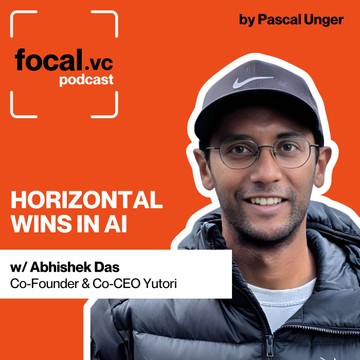
Dec 1, 2025 • 57min
Why Horizontal Beats Vertical in AI Agents | The Compounding Error Problem Most Founders Miss | The Case For Research-Heavy Teams Win | How to Build AI That Actually Generalizes with Abhishek Das, Co-Founder & Co-CEO of Yutori
The Horizontal vs Vertical AI Debate: Why This Ex-Meta AI Researcher Is Betting Big on Horizontal Web AgentsShould you build narrow (vertical) or go broad (horizontal) in AI? This episode unpacks why one PhD researcher abandoned his working vertical product to chase a much riskier horizontal bet - and why VCs leaning heavily into vertical AI might be missing something.Abhishek Das is the co-founder and co-CEO of Yutori, which has raised over $15 million from Radical Ventures, Felicis, and prominent angels including Ali Gil, Sarah Guo, Scott Belsky, and Guillermo Rauch. Previously a research scientist at Meta's FAIR lab, Abhishek holds a PhD from Georgia Tech where he pioneered work on AI agents that can see, talk, and act starting in 2016.In Today's Episode We Discuss:00:53 - Why how we interact with the web hasn't changed in three decades and what will break that02:27 - The coming shift from manual browsing to AI assistants performing tasks in the background05:57 - What "agents" actually meant in ML research before the term became overloaded06:14 - Why 90% accuracy per step creates catastrophic failure rates over multi-step workflows08:46 - The behavior pattern humans nail intuitively that machines struggle with: backtracking from errors10:11 - The DoorDash experiment: building an end-to-end food ordering agent that never shipped12:58 - Why training on sinle websites leads to memorization instead of generalization13:03 - The dopamine problem: some tasks users don't want automated15:08 - Why capability-scoped beats website-scoped: the pivot to read-only horizontal agents18:05 - Three criteria that drove the horizontal decision: research, user value, and data strategy24:18 - Scouts API launch: why different channels have different risk appetites for web agents26:30 - Flying close to the sun: how Yutori competes with hyperscalers on horizontal AI30:32 - What VCs should actually test for in horizontal AI teams beyond founder horsepower32:10 - Why three-month roadmaps are the only reasonable planning horizon in AI today33:05 - The dogfooding ritual: every team member rotates through user feedback weekly34:50 - Why research and product can't be siloed and how ideas flow both directions36:03 - The uncomfortable truth: end users don't care about your research breakthroughs37:32 - The Nintendo Switch 2 problem: aggregating individual feedback into systemic fixes39:35 - Reframing web agents as "buyer's agents" that filter the internet on your behalf40:59 - The simulation bet: training agents on cloned websites for high-stakes irreversible actions43:05 - Why initial team skepticism about Scouts' value proposition was completely wrong45:01 - How scout reports contextualize results with reasoning and ingest feedback over time47:52 - The core insight test: where does your instinct lie across research, market, and domain?49:36 - The hiring trap: why preemptively hiring sales leadership to impress VCs backfires51:18 - The 12-year-old advice that still guides him: "Be a sponge when entering a new space"53:05 - Non-negotiables: walking the dog with podcasts and personally reading every user email54:49 - What founders actually need from VCs: direct and timely feedback, not just capital
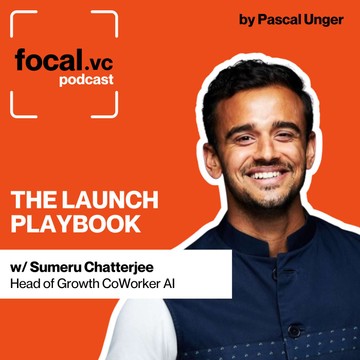
Nov 17, 2025 • 1h 20min
Why 90% of B2B Launches Fail | The 10-Week Blueprint That Built 4 Unicorns | Why Different Beats Better in AI Marketing | How to Turn 10 Employees Into 500K Reach | Sumeru Chatterjee, Head of Growth at CoWorker AI
Stop launching into the void and start creating campaigns that actually get attention.Sumeru Chatterjee reveals the exact 10-week playbook he's used to generate millions of impressions at four unicorns, including why most B2B launches fail and how to weaponize your investor network for maximum impact. You'll discover why emotion beats logic in B2B marketing and why treating existing features as "new launches" is the growth hack nobody talks about.Sumeru Chatterjee is Head of Growth at CoWorker AI, the first AI agent for complex work. Previously an early employee at four unicorns and founder of LaunchMob agency, Sumeru orchestrated CoWorker's launch that generated over 1 million impressions in a single day with 75 investors coordinated like a military operation.In Today's Episode We Discuss:03:45 - Mine 20 customer calls for launch gold using AI07:29 - Stop hiring humans: Why fear sells better than features10:23 - The 200 dream customers exercise founders skip14:50 - Find 50 influencers who already own your audience18:05 - Three distribution channels max or you'll fail everywhere20:40 - Everyone claims differentiation but nobody actually commits29:48 - The $20 book that made Hormozi $60 million35:36 - Competitive positioning vs contextual positioning changes everything38:28 - 46 creative concepts: From white papers to doormats44:16 - Product Hunt is dead for B2B launches54:05 - Coworker's investor spreadsheet that drove 1M impressions01:08:44 - Launch every two weeks or become irrelevant01:11:03 - OpenAI launches Slack integration like it's revolutionary01:14:37 - Your 10 employees are connected to 500,000 people01:15:37 - Different is better than better always wins01:18:04 - Master one funnel before attempting anything else
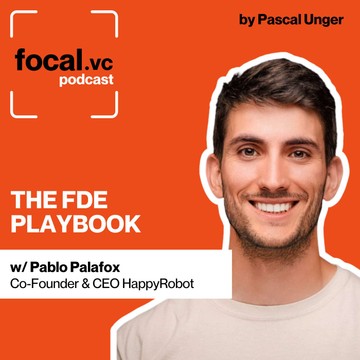
Nov 3, 2025 • 1h 20min
Why Every AI Company Needs Forward Deployed Engineers | Why You Cannot Build Vertical AI Without Living at the Customer | The 10X Deployment Unlock Nobody Talks About | Pablo Palafox on Building Happy Robot from $0 to Millions in 2 Years
The forward deployed engineer model took Happy Robot from zero to millions in revenue in under 2 years.In this episode, Pablo Palafox reveals exactly how to implement Palantir's FDE motion at a startup - including when to use it, who to hire, and the costly mistakes to avoid. Learn why embedding engineers directly with customers beats traditional sales approaches for complex AI products.Pablo Palafox is the co-founder and CEO of Happy Robot, the AI-native operating system for supply chain and logistics. Prior to Happy Robot, Pablo completed his PhD in computer science and deep learning. Happy Robot has raised over $60M from investors including a16z, YC, and Base10, and serves enterprise customers like DHL.In Today's Episode We Discuss:02:01 - When the CEO realizes they're actually the company's first FDE05:13 - Why embedding with customers beats having a sales pitch09:01 - Stop trying to copy Palantir - build your own FDE playbook13:25 - The critical difference between FDEs and deployment strategists17:19 - How Discord servers led to billion-dollar freight broker clients21:33 - FDEs must become industry insiders, not just tech experts25:46 - When NOT to use the forward deployed engineer model30:55 - The FDE hiring secret: Look for "nerds who can sell"36:35 - Why FDEs need 1-2% equity vs 0.1-0.5% for regular engineers41:49 - An FDE's day: 80% building, 20% with customers onsite47:00 - The $30K to $3M expansion playbook for FDE accounts52:10 - Building FDE "pods" for vertical specialization56:27 - Why waiting to verticalize FDEs was their biggest mistake59:19 - The 10X deployment accelerator most startups forget62:00 - Why FDEs will soon build entire vertical products autonomously64:58 - When to transition from "things that don't scale" to scale67:11 - The one place every vertical AI founder must go immediately
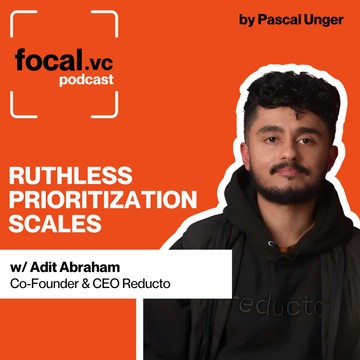
Oct 27, 2025 • 54min
Why 8 To-Do Items Will Kill Your Startup | Why VC Money Is Rocket Fuel, Not Experimentation Money | How Reducto Hit Fortune 10 Deals With 4 People | The One Priority Rule That 10x'd Velocity | Adit Abraham, CEO & Co-Founder of Reducto
Why saying "no" is the secret to growing faster as a startup founderMost founders think raising $100M means spending aggressively. Adit Abraham raised $108M and spent only $1M - while landing Fortune 10 contracts very early on and having experienced zero enterprise churn to date.In this episode, he reveals the counterintuitive focus strategies that helped Reducto turn documents into data better than anyone else, including why they fired a $5K contract, limited engineers to one priority per week, and spent months recruiting a single PhD instead of scaling the team quickly.Adit Abraham is the co-founder and CEO of Reducto, an AI company that transforms documents into structured data for language models. He previously worked at Google and attempted other startups before Reducto, where he learned the hard lessons about focus that now drive his company's success. Reducto has raised over $100M from A16Z, Benchmark, First Round Capital, and Y Combinator.In Today's Episode We Discuss:02:04 - Pivoting from a viral product before Y Combinator even began05:48 - How free computer vision consulting revealed real product-market fit07:29 - The exact moment founders know they've found product-market fit08:03 - Why going one layer deep on ideas is the most dangerous founder trap11:10 - Choosing two PDF features over 35 file types competitors supported14:54 - Turning down construction document contracts worth millions in revenue17:10 - Past startup failures that became the blueprint for saying no successfully22:25 - Cutting engineer to-do lists from 10 items to 1 weekly priority27:45 - The doctor-patient framework that makes rejecting customers feel collaborative31:35 - Maintaining velocity while scaling from 4 to 20 high-agency employees36:08 - Prioritization without spreadsheets: qualitative judgment over point systems38:50 - Spending $1 million after raising $108 million from top-tier VCs40:52 - Why their first research hire is one of 10 best in world for document AI46:35 - The fitness trainer analogy every founder misunderstands about company building49:14 - When "stay lean" advice becomes the wrong strategy for your stage50:16 - Why full-time commitment creates space for different experiments than side projects52:04 - The VC conversation that made sharing bad news feel safe instead of scary
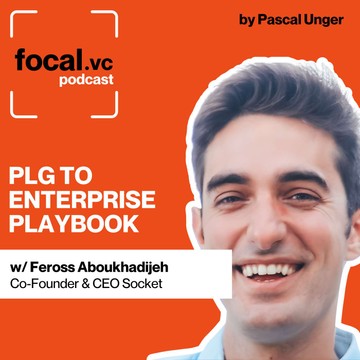
Oct 20, 2025 • 47min
How Developer Tools Win Enterprise Without Losing Their Soul | How To Nail Pricing As A PLG Company | Why Building for Free Users First Nearly Cost Us the Market with Feross Aboukhadijeh, CEO & Co-founder of Socket
Every bottom-up PLG company faces this tension:PLG gets you in. Enterprise funds the future. They need vastly different products - how do you prioritize?If you try to please both motions at once, you starve both.How to balance PLG with enterprise is what I discuss with Feross Aboukhadijeh, the CEO and co-founder of Socket ($65M raised from a16z, Abstract, Dylan Field, Aaron Levie, and other).Socket, a developer-first security platform protecting code from vulnerable and malicious dependencies. Before Socket, Feross was an open source maintainer and developer who built widely-used libraries.In Today's Episode We Discuss:01:43 - How developer background dictated Socket's PLG-first strategy over enterprise04:50 - Building a GitHub app in 48 hours to avoid launching with zero user capture07:56 - The counterintuitive rule: launch with intentionally missing enterprise features10:53 - Why Socket deliberately ignored vulnerabilities despite every competitor offering it11:20 - The dirty secret of startup pricing pages most founders won't admit15:37 - How Socket mistakenly modeled pricing after GitHub's public/private repository strategy16:08 - Why cryptocurrency companies exposed a fatal flaw in Socket's pricing model18:19 - Going straight to enterprise sales to defend against fast-following competitors19:37 - Why product quality loses to inferior products with superior go-to-market21:36 - Socket's first enterprise deal was $500 and they kept doubling until pushback24:27 - When PLG and enterprise roadmaps become zero-sum resource battles26:27 - The strategic mistake of abandoning PLG motion after enterprise traction28:54 - How developer awareness creates unfair advantages in security tool evaluations29:23 - Enterprise handholding versus self-serve product design create opposing company muscles33:01 - Figma's playbook: how connecting free-to-enterprise destroys customer acquisition costs36:12 - The biggest regret: not building the PLG funnel before enterprise distraction hit40:57 - Getting SOC 2 on day one would have parallelized six months of enterprise delays41:00 - The monstrosity trap: second-time founders who hire VPs before product-market fit40:13 - Why the popular advice to limit cap table size is fundamentally wrong41:05 - Why Feross regrets turning away a $10K angel investment over ego43:24 - The technical founder's fatal mistake: choosing to code over customer conversations45:04 - Why selling before building feels wrong but saves months of wasted development45:13 - The Mom Test: the book that teaches founders how to extract honest customer feedback
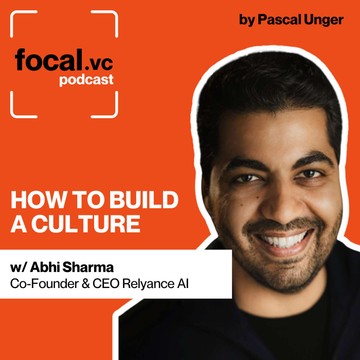
Oct 13, 2025 • 1h 10min
Why 99% of Startups Get Culture Wrong Until It's Too Late | Culture Is Actions Not Words | Founder Mode Is Not Micromanagement | Why Culture Problems Always Surface Too Late |Abhi Sharma, CEO & Co-Founder of Relyance AI
Most startup founders discover they have a culture problem when things are already breakingToday, we discuss how to build the right culture before the wrong one costs you millions.Every founder thinks about culture, but almost none do it right. Abhi Sharma, a second-time founder / now the founder and CEO of Relyance AI, learned this the hard way after reaching several million in ARR. Things were breaking and he couldn’t pinpoint exactly why. Now he shares the exact framework he uses to build culture that actually scales - from defining your company's "invariant" to implementing tactical excellence across every department.Abhi Sharma is the co-founder and CEO of Relyance AI, a company building super intelligence for data security. To date, Relyance has raised over $60 million from top-tier investors including Menlo Ventures, Unusual Ventures, and Microsoft's M12 Venture Fund.In Today's Episode We Discuss:00:01:41 - Why culture always feels like an afterthought until systems break and you can't explain why00:03:35 - The exponential dissipation problem: how founder control over culture disappears faster than you think00:05:09 - Three catastrophic ways poor culture manifested at Relyance: hiring mistakes, product strategy disconnects, and enablement failures00:09:59 - Why shouting culture values from the rooftops fails: the unreasonable hospitality pivot that actually worked00:12:14 - The $X million ARR wake-up call: when Abhi realized he was getting hires wrong and had to define operating principles00:15:25 - From weekend reflection to company DNA: the exact process of distilling culture down to actionable principles00:17:11 - The one piece most founders iterate on after writing culture docs (and why examples matter more than principles)00:20:21 - Your company's invariant: why every startup is ultimately about one core idea that never changes00:23:56 - Stripe's GDP example: how the best companies anchor to fundamental human behaviors, not features00:25:14 - The Hedgehog Concept decoded: three components that create your competitive moat (straight from Jim Collins)00:28:06 - Data journeys as superpower: why Relyance's unique differentiator became their core product feature00:30:08 - Economic driver vs. pricing: why most founders confuse the two and how it kills scalability00:32:54 - Dominance friction: how misalignment between business model and customer value creates disruption vulnerability00:33:28 - Costco's profit-per-square-foot model: the counterintuitive pricing strategy that drives more volume00:37:30 - Why it took three years to figure out Relyance's economic driver (and why that's perfectly okay)00:38:50 - Culture is actions, not words: why cultural values without operating blueprints are worthless00:40:57 - The trust operating principle: Stockdale Paradox, job vs. responsibility, and good news fast vs. bad news faster00:45:20 - How job versus responsibility transforms employees into owners (and why most companies fail at this)00:47:23 - Why "you don't get credit for 80% to the moon" is the ultimate accountability framework00:49:16 - Making escalation a good word: rewiring team psychology around bad news and urgency00:51:41 - The belief system cherry on top: three statements that tie everything together and fit on a sticker00:55:19 - Tactical excellence: why Control-C, Control-V matters more than inspiration (and how to operationalize culture daily)00:58:20 - The monthly new hire ritual Abhi still does himself: why culture onboarding can never be delegated00:59:49 - Founder mode vs. micromanagement: Brian Chesky was right, but where's the line?01:01:22 - The X vs. X+Y million ARR question: why every growth gap traces back to cultural problems01:03:26 - Popular bad advice: why "hire executives and step away" is wrong and when founder instinct trumps expertise01:05:06 - The brutal honesty test: if you're not all-in, don't start a company (and why vanity startups fail 100% of the time)01:06:16 - Reflection time as competitive advantage: how America's polymaths and founding fathers made progress through going inward01:06:48 - The first five deals rule: why Abhi banned VC introductions for Relyance's initial customers (and why it was magical advice)01:09:36 - Product-market fit vs. AI hype: are you hacking your way to ARR or truly iterating toward customer pain?
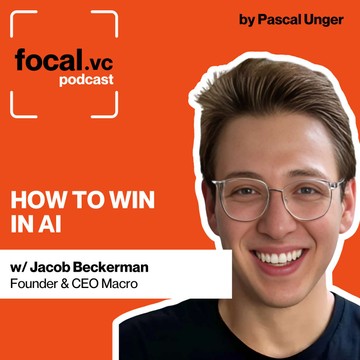
Oct 6, 2025 • 49min
Why Every SaaS Category Will Die | Why 93% Gross Margins Are Over | Why You Must Be 10x More Ambitious in AI | Why Software Becomes Like Fashion | Jacob Beckerman, CEO of Macro
The software industry's 30-year business model is becoming obsolete - this founder is betting his company on what comes next.Why listen: Jacob Beckerman reveals why the cost of code approaching zero means every software company needs to rethink everything - from margins to moats to hiring. He's open-sourcing his entire codebase, hiring poets alongside engineers, and building for a world where brand matters more than features.Jacob Beckerman is the founder and CEO of Macro, an AI workspace startup that has raised over $32 million from Andreessen Horowitz and Box Group. He previously conducted AI research at Penn and worked at Bridgewater Associates.In Today's Episode We Discuss:00:00 - Why everything you learned about building software companies is now obsolete01:47 - The three radical changes coming as software development costs hit zero05:47 - Why 93% gross margins are dead and cursor operates at 20%08:28 - The new rulebook: ambition, openness, and brand over features11:06 - Why being "principled" and narrow will kill your startup13:11 - From seven-figure PDF reader to replacing Slack, Notion, and Linear simultaneously17:19 - Open-sourcing your entire codebase as competitive advantage20:50 - Why you're selling integrations and intelligence, not software22:26 - Hiring poets and MFAs instead of MIT engineers27:50 - Software brands becoming like fashion: Salesforce as Kirkland30:34 - Traditional moats are dead—what actually matters now32:32 - "Would you rather wrap a database or superintelligence?"35:00 - Infinite demand for intelligence vs finite meeting summaries40:00 - Why zombie unicorns have their heads in the sand about AGI42:26 - Battle scars matter more than startup advice47:22 - "Get the hell out of the way and let me go on my journey"
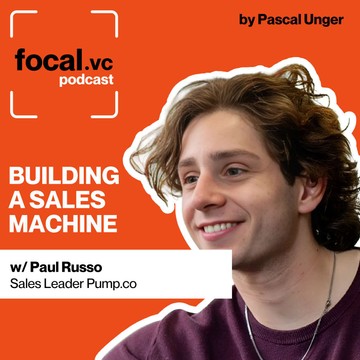
Sep 29, 2025 • 57min
How Pump became one of the fastest growing YC companies | Why D1 Athletes Win at Sales | Why Experience is Overrated in Early-Stage Hiring | The 4:30am Cold Call Strategy | Paul Russo, Sales Leader at Pump.co
Pump.co is one of the fastest growing YC companies. They got there partially by building an incredible sales team, stacked with talent that was overlooked by many.In this episode, Paul Russo, a sales leader at Pump unpacks a sales-hiring system built for aggressive, early-stage growth. You’ll hear how to source elite junior talent, pressure-test them with mock cold calls, and ramp them into technical AEs who still outbound hard. He also shares promotion gates, call quotas, and the culture required to chase incredibly ambitious goals.Our guest Paul Russo is employee #1 and a sales leader at Pump.co, the company that helps startups save up to 60% on cloud costs - for free.In Today’s Episode We Discuss:05:09 - The “weird” target formula forcing 20% month-over-month revenue growth.07:48 - Do individual-sport athletes outperform team players in enterprise sales?09:10 - Outbound-first: hire technical AEs over “been-there enterprise” veterans.11:22 - Why we prefer scientists over business majors for AWS selling.11:43 - Recruit “future founders” and frame the role as founder school.13:24 - Scale with hungry rookies led by seasoned pod leaders.15:24 - YC Bookface + Top-20 schools: an elite sales-athlete pipeline.20:02 - Cold-call candidates with traction—sell the unicorn vision first.23:10 - COO screen routes talent; extroverts go sales, introverts to ops.26:01 - Mock cold calls, no context: test grit, tone, coachability fast.29:09 - Demand real conflict stories—“I never fight” is a red flag.29:52 - Assess disciplined routines: 4:30am calls require athlete-like habits.31:10 - Explain FinOps simply: reserved instances are leases, not compute.35:39 - Cultural bar: 12–16-hour days, aiming for a 2028 IPO.37:48 - Onboarding: Pump University, daily mocks, Nooks-powered 750-call days.40:36 - Two-month ramp; PIPs are coaching tools, not pre-firing.43:04 - Promotion ladders with hard gates; AEs still dial 250/day.47:08 - Friendly pod rivalry + “rebuttal ball” spreads best practices.53:41 - First sales hire playbook: top-school hunter, athlete, founder-aspiring—equity-heavy.


